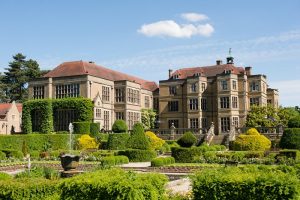Decoding Whole Genome Doubling: Insights From Evolution, Development and Disease
Organisers: Renata Basto and Zuzana Storchova
Date: 2 – 5 November 2025
Location: Fanhams Hall, Hertfordshire, UK
Whole genome doubling (WGD) leading to physiological polyploidy, which is the presence of more than two copies of the whole chromosome set, is a common phenomenon observed in plants and animals. This natural occurrence serves various purposes in different organisms. For example, certain cells within specialised organs or tissues undergo genome doubling to enhance metabolic activity. In mammals, megakaryocytes exemplify this as they produce proteins and RNAs to form anucleated platelets. Polyploidisation can also provide barrier functions, as seen in Drosophila sub-peripheral glia. Whole genome doubling is considered a major driving force in plant evolution, as polyploid plants often show a competitive advantage over diploid individuals.
However, unscheduled WGD can have detrimental consequences for the organisms, such as in the context of human cancers. The occurrence of WGDs is believed to contribute to the rapid evolution of the cancer genome by favouring chromosomal instability and thus enabling the selection of advantageous karyotypes. Recent progress in the field underscores the transformative nature of WGD and opens new avenues to gain understanding of the mechanistic basis of the processes triggered by WGD in cancer and evolution.
Although the study of WGD and polyploidy in vivo encompasses a range of model systems, from yeast to multicellular organisms like plants, Drosophila, Xenopus and mice, the field remains relatively small and lacks a shared platform for scientific exchange and collaboration. Existing meetings focus primarily on physiological polyploidy in specific model organisms, resulting in a fundamental divide between researchers working on WGD in plants and those studying other organisms. This meeting aims to bridge this gap by bringing together experts from diverse fields, encompassing the physiological and non-physiological aspects of polyploidy, from yeast through plants to humans. By contrasting and overlapping findings, we will enhance our understanding of polyploidy as both a developmental choice and a contributor to genetic instability and cancer.
Organisers & speakers
Renata Basto Institut Curie, France
Zuzana Storchova University of Kaiserslautern, Germany
Uri Ben-David Tel Aviv University, Israel
Kirsten Bomblies ETH Zurich, Switzerland
Clotilde Cadart Institut Cochin, France
Brian Calvi Indiana University Bloomington, USA
Sangita Choudhury Harvard Medical School, USA
Daniela Cimini Virginia Tech, USA
Chantal Desdouets Centre de Recherche des Cordeliers, France
Don Fox Duke University, USA
Matilde Galli Hubrecht Institute, The Netherlands
Gohta Goshima Nagoya University, Japan
Nicholas McGranahan University College London, UK
Catriona Munro Laboratoire de Biologie du Développement de Villefranche-sur-mer, France
David Pellman Harvard Medical School, USA
Bethan Psaila University of Oxford, UK
Simen Rød Sandve Norwegian University of Life Science, Norway
Iva Tolić Ruđer Bošković Institute, Croatia
Ryota Uehera Hokkaido University, Japan
Yves Van de Peer Ghent University, Belgium
Early-career researchers
We offer 10 funded places for early-career researchers (PhD, postdocs and PIs in the first three years of their first appointment) to attend our Workshops along with the 20 invited speakers. We just ask that you pay for your own travel costs. If you would like to attend please complete the online application form and include a one page CV and a letter of support from your supervisor. If your supervisor would prefer to send the letter directly to us please ask them to email it to workshops@biologists.com
All attendees are expected to actively contribute to the Workshops by asking questions at presentation sessions and taking part in discussions, as well as giving a short talk on their research.
At some Workshops, early-career researchers are given additional responsibilities to promote their involvement, such as:
-
- Write a blog post for one of our community sites: The Node, FocalPlane or preLights
- Summarise the previous day’s themes to set the scene for the next day’s sessions
- Propose future directions and collaborations
- Make a short two minute video on their experience at the Workshop
Most of these activities would be carried out in pairs or small groups and often with the support of more senior scientists present.
About Fanhams Hall

The Workshop will be held at the beautiful Fanhams Hall in Hertfordshire. An exceptional combination where old tradition meets the 21st century, Fanhams Hall Hotel is a Jacobean Manor House. Set in 27 acres of stunning Grade I listed grounds it boasts many features including a Grade II listed Japanese Tea House and formal gardens.
The hotel’s Hertfordshire location is just a short distance from all the major routes into London, Stansted, M1, M25 or simply the A10 just around the corner.
Fanhams Hall
Fanhams Hall Road
Ware
Hertfordshire
SG12 7PZ
United Kingdom
Tel: +44 (0)1920 460511








You must be logged in to post a comment.